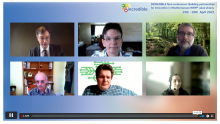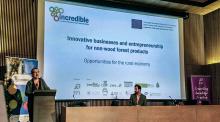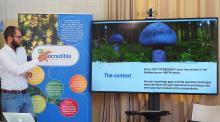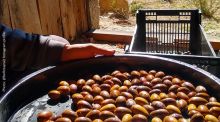Forest-based Solutions: Linking NWFP with the Economy, Participatory Approaches

When it comes to sustainable forest management, it is important to see the forest for more than just the trees. In a plenary session for the Sixth Mediterranean Forest Week (6MFW) in Lebanon from 1-5 April, the European Forest Institute Mediterranean Facility (EFIMED) focused on “Forest-based Solutions: Linking Non-Wood Forest Products (NWFP) with the Economy, Participatory Approaches”. This plenary session was chaired by Christine Farcy, the Chair of the FAO European Forestry Commission and a Board Member for the European Forest Institute.
Drawing on exciting progress made through the Innovation Networks of Cork, Resins and Edibles in the Mediterranean Basin (INCREDIBLE) project, experts from both the Northern and Southern Mediterranean regions joined in a round-table discussion to present inspiring examples of social entrepreneurship around NWFP and land restoration through participatory approaches in Mediterranean forests around NWFP. Through partnerships in projects spanning the basin, experts shared their experiences in cases of international collaboration.
The session started with two keynote speakers from Algeria: Nabil Assaf, FAO representative in Algeria, on how to improve populations livelihoods through the development of micro-enterprises based on NWFP, and Nedjma Rahmani, sub-inspector at the General Directorate of Forests of Algeria, on how to unleash the potential for Mediterranean NWFP through key opportunities for innovation. They both exposed in detail the Algerian situation. This country, where the majority of the forest is publicly owned, succeeded to implement regulatory framework for NWFP, with strategies for their management and valorisation. Now, public-private partnerships are possible, so private individuals or companies can harvest forest resources through concessions with the State. This is accompanied by financial mechanisms for supporting SME, technical cooperation, a territorial vision and population awareness.
As challenges, Algeria would need to strength the regulatory framework, consolidate sustainable management, fill in some knowledge gaps and continue making NWFP contribute to the population wellbeing. Therefore, the logical next steps are strengthening the value chains, promoting micro-enterprises, improving traditional and scientific knowledge flows and increasing NWFP to national food security.
NWFPs to improve the environment and increase social wellbeing
These enlightening speeches were followed by a round table showing how participatory approaches that link NWFP with the economy can provide sound solutions to improve, or even restore, the environment and increase social wellbeing.
Tiziana Ulian from Royal Botanic Gardens, Kew (UK) and Nizar Hani from the Ushouf Biosphere Reserve (Lebanon) exposed how forest restoration activities can be linked to the production of NWFP and eco-tourism, with fully inclusion of local communities.
Carlos Colinas from University of Lleida (Spain) and Zahra Naghavi, an expert from Iran, collaborate in an international project on truffle cultivation. This may be the key activity to provide rural people with an important source of income, therefore fighting against rural abandonment. European expertise can be exported to other countries where truffle cultivation can relieve poverty and reduce the overexploitation of other forest products.
Karim Ergaieg from Agricultural Development Group Sidi Amor (Tunisia) proved that when the participatory approach is supported by an appropriate legal framework, the collaboration of local communities can boost the socio-economic conditions for the youth, preserve traditional knowledge and even restore forest ecosystems.
Finally, Eduard Mauri from EFI’s Mediterranean Facility, EFIMED (Spain) demonstrated that in the NWFP sector, as in many sectors, different countries share the same problems. For them, someone usually has the solution, but it may be not disseminated enough. Do not reinvent the wheel: let us gather together around the INCREDIBLE project to share our knowledge and improve our current state.















 El proyecto INCREDIBLE recibe fondos del programa Horizon 2020 de la Comisión Europea en el marco del acuerdo de subvención Nº 774.632.
El proyecto INCREDIBLE recibe fondos del programa Horizon 2020 de la Comisión Europea en el marco del acuerdo de subvención Nº 774.632.
Comentarios (5054)
ai for chrome offline dinosaur game https://chromedinos.com
how to play with the dinosaur on google chrome https://chromedinos.com
mario dinosaurs https://chromedinos.com
gamer dino https://chromedinos.com
best ringtones https://ringtonessbase.com
best ringtones https://ringtonessbase.com
best ringtones https://ringtonessbase.com
best ringtones https://ringtonessbase.com
best ringtones https://ringtonessbase.com
best ringtones https://ringtonessbase.com
best ringtones https://ringtonessbase.com
best ringtones https://ringtonessbase.com
instrumental ringtones https://downloadfreeringtoness.com/instrumental-ringtones
marimba remix ringtones https://downloadfreeringtoness.com/marimba-remix-ringtones
music ringtones https://downloadfreeringtoness.com/music-ringtones
marimba remix ringtones https://downloadfreeringtoness.com/marimba-remix-ringtones
wwe theme songs https://downloadfreeringtoness.com/wwe-theme-songs-ringtones
music ringtones https://downloadfreeringtoness.com/music-ringtones
music ringtones https://downloadfreeringtoness.com/music-ringtones
samsung ringtones https://downloadfreeringtoness.com/samsung-ringtones
funny ringtones https://downloadfreeringtoness.com/funny-ringtones
samsung ringtones https://downloadfreeringtoness.com/samsung-ringtones
free sound effects https://sounddeffects.com
<a href="https://darkskyarmory.com/product/cci-209-primer-shotshell/"rel"dofollow">CCI 209 Primer Shotshell</a>
<a href="https://darkskyarmory.com/product/winchester-large-pistol-primers-1m/"rel"dofollow">Winchester Large Pistol Primers 1M</a>
<a href="https://darkskyarmory.com/product/winchester-large-rifle-primers-magnum/"rel"dofollow">Winchester Large Rifle Primers Magnum 8 1/2M-120 RF Primer</a>
<a href="https://darkskyarmory.com/product/federal-large-rifle-primers-1/"rel"dofollow">Federal Large Rifle Primers</a>
<a href="https://darkskyarmory.com/product/fn-502-tactical-22lr-pistol/"rel"dofollow">FN 502 Tactical 22LR Pistol</a>
<a href="https://darkskyarmory.com/product/winchester-powder-autocomp-8lb/"rel"dofollow">Winchester Powder AutoComp 8lb</a>
<a href="https://darkskyarmory.com/product/hodgdon-800-x-powder-8lb/"rel"dofollow">Hodgdon 800-X Powder - 8lb</a>
<a href="https://darkskyarmory.com/product/hodgdon-h380-powder-8lbs/"rel"dofollow">Hodgdon H380 Powder 8lbs</a>
<a href="https://darkskyarmory.com/product/hodgdon-int-clays-powder-14oz/"rel"dofollow">Hodgdon Int Clays Powder</a>
<a href="https://darkskyarmory.com/product/hodgdon-pyrodex-powder-rs-1lb/"rel"dofollow">Hodgdon Pyrodex Powder RS 1lb</a>
<a href="https://darkskyarmory.com/product/hodgdon-800-x-powder-8lb/"rel"dofollow">Hodgdon 800-X Powder - 8lb</a>
<a href="https://darkskyarmory.com/product/hodgdon-blc2-powder-8lb/"rel"dofollow">Hodgdon blc2 Powder 8lb</a>
<a href="https://darkskyarmory.com/product/hodgdon-h1000-powder-8lb/"rel"dofollow">Hodgdon H1000 Powder 8lb</a>
<a href="https://darkskyarmory.com/product/hodgdon-h4350-powder-8lb/"rel"dofollow">Hodgdon H4350 Powder 8lb</a>
<a href="https://darkskyarmory.com/product/winchester-powder-296-8lb/"rel"dofollow">Winchester Powder 296 8Lb.</a>
<a href="https://darkskyarmory.com/product/winchester-760-powder-8lbs/"rel"dofollow">Winchester 760 Powder 8lbs</a>
<a href="https://darkskyarmory.com/product/remington-no-9-1-2-large-rifle-primers/"rel"dofollow">Remington No. 9 1/2 Large Rifle Primers</a>
<a href="https://darkskyarmory.com/product/winchester-large-rifle-primers-8-5-120/"rel"dofollow">Winchester Large Rifle Primers #8.5-120</a>
<a href="https://darkskyarmory.com/product/fiocchi-large-rifle-primers/"rel"dofollow">Fiocchi Large Rifle Primers</a>
<a href="https://darkskyarmory.com/product/fiocchi-209-shotshell-primers/"rel"dofollow">FIOCCHI 209 SHOTSHELL PRIMERS</a>
<a href="https://darkskyarmory.com/product/hodgdon-cfe-223-powder-8lbs/"rel"dofollow">Hodgdon CFE 223 Powder 8lbs</a>
<a href="https://darkskyarmory.com/product/hodgdon-800-x-powder-keg-8-lb/"rel"dofollow">Hodgdon 800-X powder Keg</a>
<a href="https://darkskyarmory.com/product/alliant-red-dot-powder-8-lbs/"rel"dofollow">Alliant Red Dot Powder 8 lbs</a>
<a href="https://darkskyarmory.com/product/fn-502-magazine-22lr-15-round/"rel"dofollow">FN 502 Magazine</a>
<a href="https://darkskyarmory.com/product/alliant-bullseye-powder-8lbs/"rel"dofollow">Alliant Bullseye Powder</a>
<a href="https://darkskyarmory.com/product/cz-75-ts-czechmate-parrot-9mm/"rel"dofollow">CZ 75 TS CZECHMATE PARROT</a>
<a href="https://darkskyarmory.com/product/kel-tec-p17/"rel"dofollow">Kel-tec P17</a>
<a href="https://darkskyarmory.com/product/colt-anaconda-2021-44-magnum/"rel"dofollow">Colt Anaconda 2021</a>
<a href="https://darkskyarmory.com/product/alliant-reloder-16-powder-8lbs/"rel"dofollow">Alliant Reloder 16 Powder 8lbs</a>
<a href="https://darkskyarmory.com/product/alliant-herco-powder-8lbs/"rel"dofollow">Alliant Herco Powder 8lbs</a>
<a href="https://darkskyarmory.com/product/alliant-green-dot-powder-8lbs/"rel"dofollow">Alliant Green Dot Powder 8lbs</a>
<a href="https://darkskyarmory.com/product/hodgdon-700x-powder-4lb/"rel"dofollow">Hodgdon 700X Powder 4lbs</a>
<a href="https://darkskyarmory.com/product/cobra-firearms-derringer-22-mag/"rel"dofollow">Cobra Firearms Derringer .22 Mag</a>
<a href="https://darkskyarmory.com/product/taurus-856-stainless-38-special/"rel"dofollow">Taurus 856 Stainless 38 Special</a>
<a href="https://darkskyarmory.com/product/fn-509-tactical-fde-and-black/"rel"dofollow">FN 509 Tactical</a>
<a href="https://darkskyarmory.com/product/titanium-gold-desert-eagle-pistol-50-ae/"rel"dofollow">Titanium Gold Desert Eagle Pistol 50 AE</a>
<a href="https://darkskyarmory.com/product/alliant-steel-powder-1lb/"rel"dofollow">Alliant Steel Powder - 1lb.</a>
<a href="https://darkskyarmory.com/product/alliant-unique-smokeless-gun-powder/"rel"dofollow">Alliant Unique Smokeless Gun Powder</a>
<a href="https://darkskyarmory.com/product/alliant-sport-pistol-smokeless-powder-1/"rel"dofollow">Alliant Sport Pistol Smokeless Powder</a>
<a href="https://darkskyarmory.com/product/holosun-hs507k-x2-classic-multi-reticle/"rel"dofollow">HOLOSUN HS507K-X2 Classic Multi Reticle, Red Dot Sight (Black)</a>
<a href="https://darkskyarmory.com/product/cci-br4-small-rifle-primers/"rel"dofollow">CCI BR4 Small Rifle Primers</a>
<a href="https://darkskyarmory.com/product/federal-large-rifle-match-primer/"rel"dofollow">Federal Large Rifle Match Primer</a>
<a href="https://darkskyarmory.com/product/federal-209-shotshell-primer/"rel"dofollow">Federal 209 Shotshell Primer</a>
<a href="https://darkskyarmory.com/product/federal-fusion-209ml-primer-2000-primers/"rel"dofollow">Federal Fusion 209ML Primer</a>
<a href="https://darkskyarmory.com/product/winchester-large-pistol-primer/"rel"dofollow">Winchester Large Pistol Primer</a>
<a href="https://darkskyarmory.com/product/walther-p22-q/"rel"dofollow">Walther P22</a>
<a href="https://darkskyarmory.com/product/trijicon-rmr-type-2-rm06/"rel"dofollow">Trijicon RMR Type 2 RM06</a>
<a href="https://darkskyarmory.com/product/alliant-powder-reloder-33-8lb/"rel"dofollow">Alliant Powder Reloder 33</a>
<a href="https://darkskyarmory.com/product/alliant-powder-reloder-16-1lb/"rel"dofollow">Alliant Powder Reloder 16</a>
<a href="https://darkskyarmory.com/product/alliant-powder-reloder-33-1lb/"rel"dofollow">Alliant Powder Reloder 33 1lb.</a>
<a href="https://darkskyarmory.com/product/alliant-powder-reloder-22-1lb/"rel"dofollow">Alliant Powder Reloder 22 </a>
<a href="https://darkskyarmory.com/product/alliant-powder-power-pistol-4lb/"rel"dofollow">Alliant Powder Power Pistol</a>
<a href="https://darkskyarmory.com/product/alliant-powder-promo-8lbs/"rel"dofollow">Alliant Powder Promo</a>
<a href="https://darkskyarmory.com/product/alliant-powder-herco-1-lb/"rel"dofollow">Alliant Powder Herco</a>
<a href="https://darkskyarmory.com/product/alliant-powder-power-pro-varmint-8-lb/"rel"dofollow">Alliant Powder Power Pro Varmint</a>
<a href="https://darkskyarmory.com/product/alliant-powder-extra-lite-1-lb/"rel"dofollow">Alliant Powder Extra Lite</a>
<a href="https://darkskyarmory.com/product/alliant-powder-clay-dot-8lb/"rel"dofollow">Alliant Powder Clay Dot</a>
<a href="https://darkskyarmory.com/product/alliant-powder-bullseye-4lbs/"rel"dofollow">Alliant Powder Bullseye</a>
<a href="https://darkskyarmory.com/product/alliant-powder-blue-dot-1-lb/"rel"dofollow">Alliant Powder Blue Dot</a>
<a href="https://darkskyarmory.com/product/alliant-black-mz-black-powder-substitute/"rel"dofollow"></a>
<a href="https://darkskyarmory.com/product/shooters-world-precision-rifle-powder/"rel"dofollow">Shooters World Precision Rifle Powder</a>
<a href="https://darkskyarmory.com/product/shooters-world-heavy-pistol-powder/"rel"dofollow">Shooters World Heavy Pistol Powder Smokeless Powder 8 lbs</a>
<a href="https://darkskyarmory.com/product/shooters-world-heavy-pistol-powder/"rel"dofollow">Shooters World Heavy Pistol Powder Smokeless Powder</a>
<a href="https://darkskyarmory.com/product/sig-sauer-p210-carry-pistol-9mm/"rel"dofollow">Sig Sauer P210 Carry Pistol 9mm</a>
<a href="https://darkskyarmory.com/product/remington-22lr-high-velocity/"rel"dofollow">Remington 22lr</a>
<a href="https://darkskyarmory.com/product/hodgdon-powder-800-x-8-lb/"rel"dofollow">HI-SKOR Hodgdon Powder 800-X</a>
<a href="https://darkskyarmory.com/product/alliant-powder-ar-comp-8lb/"rel"dofollow">Alliant Powder AR-Comp</a>
<a href="https://darkskyarmory.com/product/federal-small-pistol-primer-100-5000ct/"rel"dofollow">Federal Small Pistol Primer #100</a>
<a href="https://darkskyarmory.com/product/kel-tec-pmr-30-22-wmr-pistol/"rel"dofollow">KEL-TEC PMR-30 .22 WMR PISTOL</a>
<a href="https://darkskyarmory.com/product/trijicon-rmr-type-2-rm06/"rel"dofollow">Trijicon RMR Type 2 RM06</a>
<a href="https://darkskyarmory.com/product/leupold-deltapoint-pro/"rel"dofollow">Leupold Deltapoint Pro</a>
<a href="https://darkskyarmory.com/product/springfield-armory-hellcat-osp-9mm/"rel"dofollow">Springfield Armory Hellcat OSP 9mm Pistol</a>
<a href="https://darkskyarmory.com/product/colt-python-357-magnum/"rel"dofollow">COLT PYTHON 2021</a>
<a href="https://darkskyarmory.com/product/ruger-ar-556-standard-5-56/"rel"dofollow">Ruger AR-556 Standard</a>
<a href="https://darkskyarmory.com/product/rugged-oculus-22-suppressor/"rel"dofollow">RUGGED OCULUS 22 SUPPRESSOR</a>
<a href="https://darkskyarmory.com/product/american-tactical-fxh-45-moxie/"rel"dofollow">American Tactical FXH-45 MOXIE 45 ACP 1911 Hybrid Pistol</a>
<a href="https://darkskyarmory.com/product/sig-sauer-p322-22lr-pistol-4%e2%80%b3-..."rel"dofollow">Sig Sauer P322 22LR Pistol 4″ 20Rd Black</a>
<a href="https://darkskyarmory.com/product/cabot-apocalypse-1911-pistol/"rel"dofollow">Cabot Apocalypse 1911 Pistol</a>
<a href="https://darkskyarmory.com/product/springfield-armory-hellcat-osp-9mm/"rel"dofollow">Springfield Armory Hellcat OSP 9mm Pistol</a>
<a href="https://darkskyarmory.com/product/colt-python-357-magnum/"rel"dofollow">COLT PYTHON 2021</a>
<a href="https://darkskyarmory.com/product/eaa-girsan-mc-p35-pistol-4-625%e2%80%b..."rel"dofollow">EAA Girsan MC P35 pistol</a>
<a href="https://darkskyarmory.com/product/henry-all-weather-picatinny-rail-45-70..."rel"dofollow">Henry All-Weather Picatinny Rail</a>
<a href="https://darkskyarmory.com/product/sig-sauer-p322-magazine-22lr-20rounds-..."rel"dofollow">Sig Sauer P322 Magazine 22LR 20rounds/25rounds</a>
<a href="https://darkskyarmory.com/product/new-colt-python-2022-3%e2%80%b3-357-ma..."rel"dofollow">NEW COLT PYTHON 2022 3″ .357 MAGNUM</a>
<a href="https://darkskyarmory.com/product/cci-300-primers-large-pistol-primers/"rel"dofollow">CCI 300 primers Large Pistol Primers</a>
<a href="https://darkskyarmory.com/product/cci-200-primers-large-rifle-primers/"rel"dofollow">CCI 200 PRIMERS LARGE RIFLE PRIMERS</a>
<a href="https://darkskyarmory.com/product/sig-sauer-p365xl-spectre-comp-pistol/"rel"dofollow">Sig Sauer P365XL Spectre Comp Pistol</a>
<a href="https://darkskyarmory.com/product/sig-sauer-p320-spectre-comp-pistol/"rel"dofollow">Sig Sauer P320 Spectre Comp Pistol</a>
<a href="https://darkskyarmory.com/product/sig-sauer-p365-pistol-stainless-slide-9m/"rel"dofollow">Sig Sauer P365 Pistol</a>
<a href="https://darkskyarmory.com/product/sig-sauer-p226-zev-9mm/"rel"dofollow">Sig Sauer P226 ZEV 9MM</a>
<a href="https://darkskyarmory.com/product/sig-sauer-p229-legion-9mm-pistol/"rel"dofollow">SIG Sauer P229 Legion 9mm pistol</a>
<a href="https://darkskyarmory.com/product/taurus-tx22-22-lr/"rel"dofollow">TAURUS TX22 .22 LR in stock</a>
<a href="https://darkskyarmory.com/product/sig-sauer-1911-tacops-9mm-pistol/"rel"dofollow">SIG SAUER 1911 TACOPS 9MM PISTOL</a>
<a href="https://darkskyarmory.com/product/hornady-6-5-creedmoor-95-grain-v-max-v..."rel"dofollow">Hornady 6.5 Creedmoor</a>
<a href="https://darkskyarmory.com/product/barnes-vor-tx-lr-6-5-creedmoor-127-grain/"rel"dofollow">Barnes VOR-TX LR 6.5 Creedmoor 127 Grain</a>
<a href="https://darkskyarmory.com/product/winchester-super-x-12-gauge-25rds/"rel"dofollow">Winchester Super x 12 gauge</a>
<a href="https://darkskyarmory.com/product/winchester-rooster-xr-12-guage-4shots/"rel"dofollow">Winchester Rooster XR 12 gauge pheasant loads</a>
<a href="https://darkskyarmory.com/product/alliant-20-28-powder/"rel"dofollow">alliant 20-28 powder 1lb.</a>
<a href="https://darkskyarmory.com/product/alliant-2400-powder/"rel"dofollow">alliant 2400 powder 1lb.</a>
<a href="https://darkskyarmory.com/product/alliant-pro-reach-powder/"rel"dofollow">alliant pro reach powder 1lb</a>
<a href="https://darkskyarmory.com/product/alliant-powder-power-pro-1200-r/"rel"dofollow">alliant powder - power pro 1200-r</a>
<a href="https://darkskyarmory.com/product/sig-sauer-p365-extended-magazine/"rel"dofollow">Sig Sauer P365 Extended Magazine</a>
<a href="https://darkskyarmory.com/product/new-colt-anaconda-2022-44-magnum/"rel"dofollow">NEW COLT ANACONDA 2022 in stock</a>
<a href="https://darkskyarmory.com/product/kimber-rapide-black-ice-9mm-10mm-45acp/"rel"dofollow">Kimber Rapide Black Ice for sale</a>
<a href="https://darkskyarmory.com/product/benelli-lupo-bolt-action-rifle/"rel"dofollow">Benelli LUPO Bolt-Action Rifle</a>
free sound effects https://sounddeffects.com
free sound effects https://sounddeffects.com
game and interface sounds https://sounddeffects.com/game-and-interface-sounds
human sounds https://sounddeffects.com/human-sounds
car sounds https://sounddeffects.com/car-sounds
cartoon and funny sounds https://sounddeffects.com/cartoon-and-funny-sounds
game and interface sounds https://sounddeffects.com/game-and-interface-sounds
ambient sounds https://sounddeffects.com/ambient-sounds
city sounds https://sounddeffects.com/city-sounds
Hello ! I am the one who writes posts on these topics baccaratsite I would like to write an article based on your article. When can I ask for a review?
I have express a few of the articles on your website now, and I really like your style of blogging. I added it to my favorite’s blog site list and will be checking back soon… Panenpoker
Took me time to read all the comments, but I really enjoyed the article. It proved to be Very helpful to me and I am sure to all the commenters here! It’s always nice when you can not only be informed, but also entertained! event print
I’m happy I located this blog! From time to time, students want to cognitive the keys of productive literary essays composing. Your first-class knowledge about this good post can become a proper basis for such people. nice one Louisiana Fake driver's license
coursework writing services
coursework service
coursework marking
coursework science
coursework writer uk
coursework research
coursework questions
creative writing english coursework
creative writing english coursework
coursework research
coursework info
coursework sample
coursework writing
data analysis coursework
coursework project
buy coursework
do my coursework online
coursework writing service uk
coursework service
differential equations coursework
coursework writing service uk
coursework in english
coursework
data analysis coursework
do my coursework
coursework moderation
coursework in english
coursework papers
coursework writing service uk
coursework writing services
coursework master
degree coursework
coursework master
design coursework
database coursework
coursework papers
coursework science
coursework resources
coursework writer uk
Páginas
Add Comment